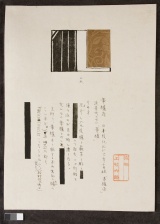Difference between revisions of "Haze + Suoh - right (2 R)"
Jump to navigation
Jump to search
(username removed) |
(username removed) |
||
| Line 1: | Line 1: | ||
| − | [[[SliderGallery rightalign| | + | [[[SliderGallery rightalign|Uemura_03-26-2009_002.jpg~Normal]]]{| class="wikitable" |
|- | |- | ||
! scope="row"|Museum number | ! scope="row"|Museum number | ||
Revision as of 10:27, 8 June 2013
| Museum number | 2 |
|---|---|
| Uemera number / title | 一; 櫨染 廿五 "Haze-some 25" |
| Folder location | 1st shelf |
| Sample location | right (2 R) |
| Fiber type | silk |
| Color | brown |
| Dyestuff (Japanese common name) | 櫨 + 蘇芳: Haze + Suoh |
| Dye (English common name) | Wax tree; and Brazilwood |
| Dyestuff (botanical name) | Taxicodendron sylvestre (Siebold et Zucc.) Kuntze; and Caesalpinia sappan L. |
| Plant part | W: heartwood (?) /dried (?); B: heartwood /dried |
| Dyestuff extraction | boiled in water (?) |
| Auxiliary agent in dye bath | - |
| Mordant | ash water |
| Other auxiliary agent | vinegar |
| Uemera's notes | The fabric was soaked in: 1) ash water; 2) wax tree bath; 3) brazilwood; and 4) vinegar. This is the color "黄櫨染 Kōro-sen" in the Heian (10 to 12 century AD) manuscript "延喜式 (Engi-shiki)". A Chinese tree called, 黄櫨木, and a Japanese tree, called 櫨 are different speices. The Chinese one is said to be Young Fustic / Rhuscotinus. L by Dr Matsumura. |
| Uemera's date | Kyoto |
